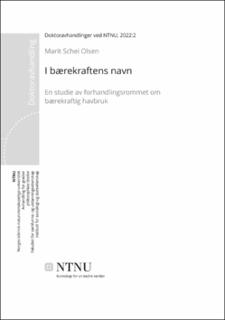I bærekraftens navn. En studie av forhandlingsrommet om bærekraftig havbruk
Doctoral thesis
Permanent lenke
https://hdl.handle.net/11250/2976651Utgivelsesdato
2022Metadata
Vis full innførselSamlinger
Sammendrag
Sammendrag
Den norske havbruksnæringen er en betydningsfull, men samtidig kontroversiell næring, særlig på grunn av dens påvirkning på miljøet. Næringen møter motstand på lokalt, nasjonalt og globalt nivå, men etterspørselen etter laks har i lengre tid vært høy. Selv om næringen og myndighetene har ambisiøse vekstvisjoner har det stadig økende presset for å bli mer bærekraftig stagnert veksten i havbruksnæringen. Dersom næringen skal vokse må dette skje på en bærekraftig måte. En sentral utfordring er imidlertid at bærekraft er et komplekst, men samtidig diffust begrep (et «wicked» eller vrangt problem), som ikke enkelt lar seg operasjonalisere eller omsette til konkret handling. Dette åpner et forhandlingsrom der interesser, aktører og strukturer møtes. Hvordan utspiller forhandlingen om bærekraftig havbruk i det offentlige rom?
Avhandlingen studerer utformingen av havbruksreguleringen og hvordan bærekraft blir det sentrale objektet som blir forsøkt oversatt, formet og tilpasset en ønsket utvikling for havbruksnæringen. Analyser av mediediskurser, intervjuer og dokumenter belyser diskursen om bærekraftig havbruk, og dens påvirkning på havbruksforvaltningen og oppfatningen av havbruksnæringen.
Avhandlingen viser hvordan fenomenet bærekraft blir et forhandlingsobjekt i ulike diskusjoner, maktrelasjoner og handlinger mellom aktører og interesser. Media har her en sentral rolle i forhandlingsrommet, og medieinnflytelsen fører til en gjensidig forsterkning av betydningen av det som kalles miljømessig bærekraft. Forhandlingen blir dermed en dragkamp mellom vekst og vern, og analysen viser hvordan myndighetene forsøker å implementere bærekraft som en teknisk måling (indikator) som skal regulere vekst, og hvordan næringen selv forsøker å demonstrere bærekraft. Det er en utfordring at diskursene om bærekraft og de tekniske instrumentene for å regulere næringen tar lite hensyn til næringens kompleksitet og kunnskapsgrunnlagets usikkerhet. Hva ‘bærekraftig havbruk’ er blir først og fremst definert politisk, da bærekraft ikke er en bestemt teknisk størrelse som kan nås eller måles nøyaktig. En mer åpen offentlig debatt om hvordan næringen kan bli mer bærekraftig og fremtidig regulering for bærekraft fordrer et bredere perspektiv på bærekraft, større åpenhet om de ulike avveiingene og prioriteringene som gjøres, og hvilke konsekvenser dette kan få. Summary
The Norwegian aquaculture industry is a significant, but at the same time controversial, industry, especially due to its environmental impact. The industry faces resistance at the local, national, and global level, still, the demand for salmon has been continuously high. Although the industry and authorities have ambitious visions for growth, the increasing pressure to become more sustainable has stagnated this growth. For the industry to be allowed growth, this must be done in a sustainable manner. A key challenge is that sustainability is a complex, but at the same time vague and diffuse, concept (a “wicked” problem), and cannot be easily operationalized or translate into concrete action. This gives rise to a negotiating space where interests, actors, and structures meet. But how does this negotiation on sustainable aquaculture play out in the public sphere?
This thesis explores the design of aquaculture regulation and how sustainability becomes the central object that different actors attempt to translate, shape, and adapt towards what is considered a desired industry development. Analyses of media articles, interviews, and documents shed light on the discourse on sustainable aquaculture, and its impact on aquaculture management and perceptions of the industry.
The thesis shows how ‘sustainable aquaculture’ becomes negotiable in discussions, power relations, and actions between actors and interests - with authorities trying to implement sustainability as a technical measurement for regulation, the industry trying to demonstrate how they are achieving it, and the media debate reinforcing the importance of environmental sustainability. The negotiation thus becomes a tug-of-war between protection and growth. The study illustrates why it is problematic that the discourses on sustainability and technical instruments for regulating the industry barely consider the industry’s complexity and uncertainty of the knowledge base. Sustainable aquaculture is primarily politically defined, as sustainability is not a specific technical size that can be accurately measured. Moving the industry in a more sustainable direction necessitates a broader perspective on sustainability, greater transparency about the tradeoffs and priorities, and their potential consequences, which should also be reflected in future regulation and in the public debate on sustainable aquaculture.
Består av
Article 1: Olsen, Marit Schei; Osmundsen, Tonje. Media framing of aquaculture. Marine Policy 2017 ;Volum 76. s. 19-27 https://doi.org/10.1016/j.marpol.2016.11.013 This is an open access article under the CC BY license (http://creativecommons.org/licenses/by/4.0/).Article B: Osmundsen, Tonje; Olsen, Marit Schei. The imperishable controversy over aquaculture. Marine Policy 2017 ;Volum 76. s. 136-142 https://doi.org/10.1016/j.marpol.2016.11.022 This is an open access article under the CC BY license (http://creativecommons.org/licenses/by/4.0/).
Article C: Olsen, Marit Schei; Thorvaldsen, Trine; Osmundsen, Tonje C.. Certifying the public image? Reputational gains of certification in Norwegian salmon aquaculture. Aquaculture 2021 ;Volum 542.(736900) s. 1-11 https://doi.org/10.1016/j.aquaculture.2021.736900 This is an open access article under the CC BY license (http://creativecommons.org/licenses/by/4.0/).
Article D: Osmundsen, Tonje Cecilie; Olsen, Marit Schei; Thorvaldsen, Trine. The making of a louse- Constructing governmental technology for sustainable aquaculture. Environmental Science and Policy 2020 ;Volum 104. s. 121-128 https://doi.org/10.1016/j.envsci.2019.12.002 This is an open access article under the CC BY-NC-ND license
